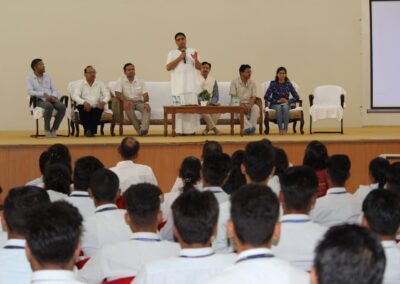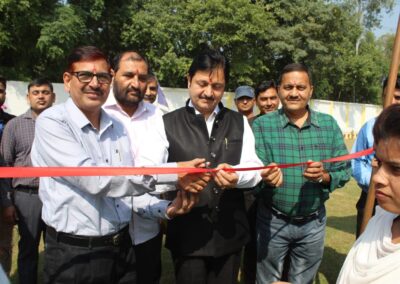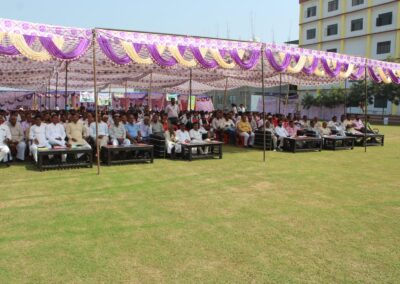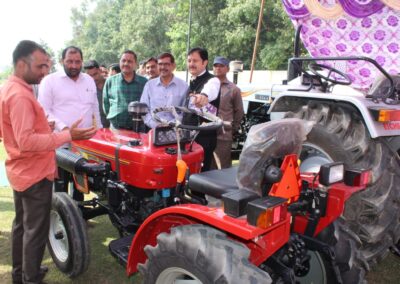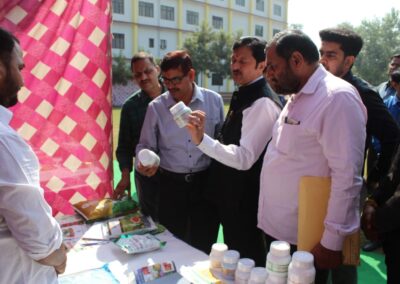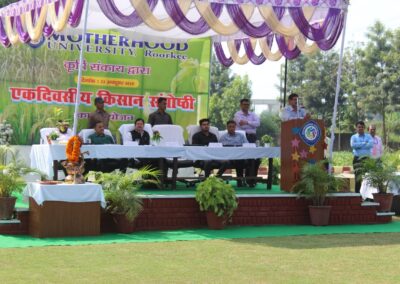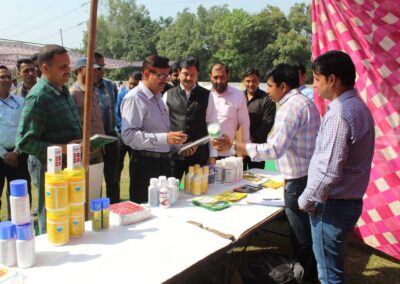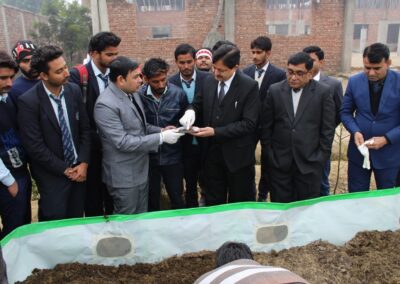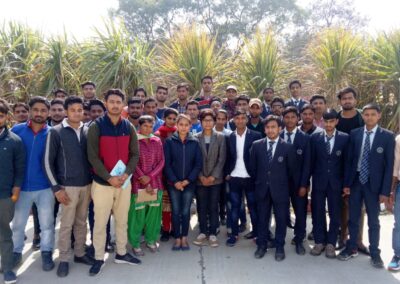Faculty of Agriculture
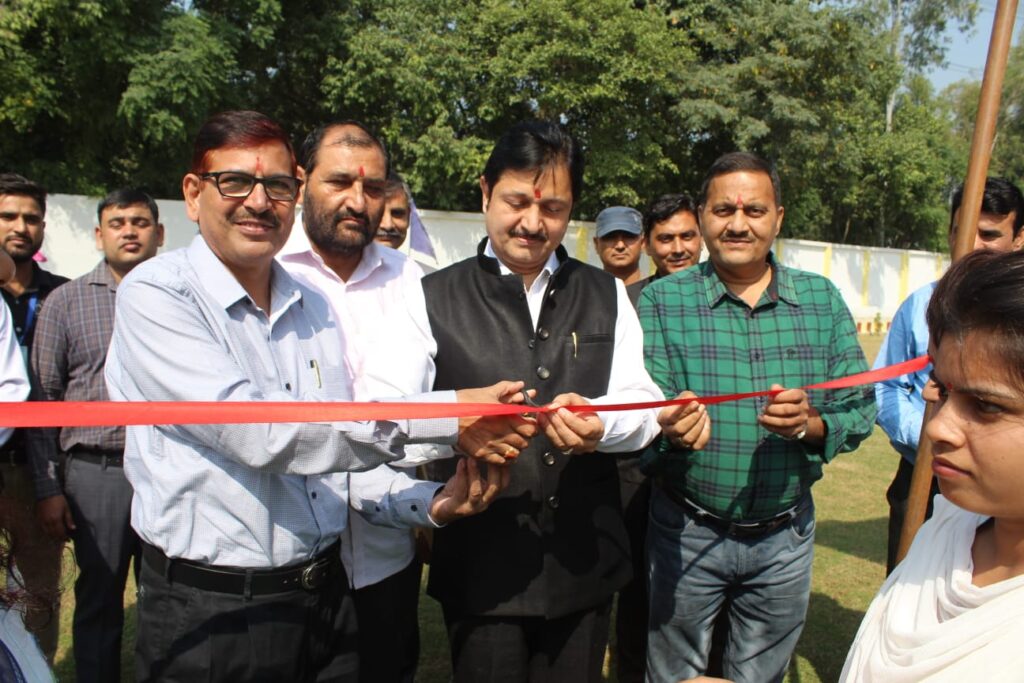
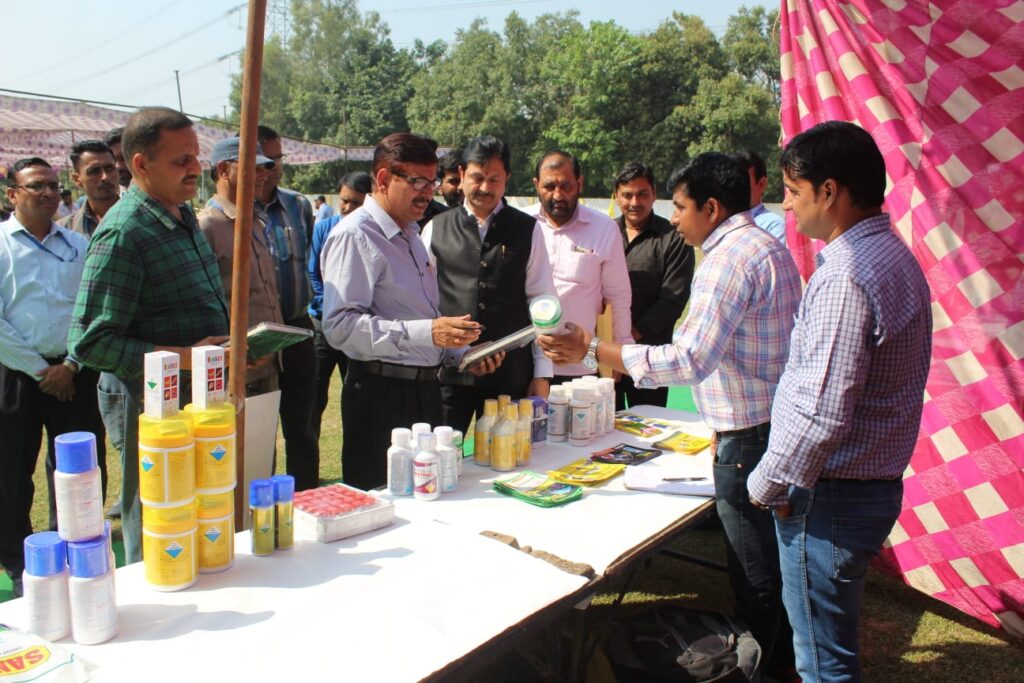
Message from Dean
WELCOME !
The course curricula of B.Sc. (Ag.) Hons. has been restructured to develop much needed skills and entrepreneurial mind-set among the graduates to take up self employment, sustainability of agriculture. In order to reorient agriculture graduates, the introduction of RAWE (Rural Agriculture Work Experience) Program is an essential prerequisite for the award of degree to ensure In Experimental Learning. Faculty of Agriculture organizes provide integrated academic, such as preparatory classes, personal development and communication skills, experiential learning programs, farm training, Guest Talks, Seminars and Workshops and other aspects of comprehension education.
Agriculture Education is the most important basic public good to produce adequately trained scientific human resources capable of carrying out teaching, research and transfer of technology activities. As the Dy. Dean of Faculty of Agriculture, I extend my best wishes to you all and congratulate you for joining Faculty of Agriculture.
DR. KRISHANPAL SINGH
DEAN & HOD
FACULTY OF AGRICULTURE
Programs Available
FoA, Motherhood University
D.Ag.
Diploma in Agriculture
B.Sc.(Ag.) Hons.
Bachlor of Science-Ag. Honours
M.Sc. Ag. (Agronomy)
Faculty of Agriculture
About
Faculty of Agriculture (FOA) is a professional learning institute with a vision to promote education and research in the field of Agriculture and establish a value-based Centre of learning. It was established to produce budding agriculture professionals. This FOA offers a four-year degree program in Agriculture i.e., B.Sc. (Ag.) Hons. The curriculum is based on 5th Dean Committee of ICAR. The aim of our FOA is not only producing the professionals who will meet the pre requisites of the growing and ever evolving global Agricultural Sector but also the professionals who can contribute to face the challenge of modernizing Indian Agriculture up to the global standard.
In B.Sc. (Ag.) Hons. provide knowledge about diversified cropping areas of the country including precision farming, organic farming and utilization of modern tools and technologies are imparted for improvement in economic farm production with paramount importance of environment protection and sustainable practices. We provide excellent learning environment for the students with practical and applicable teaching. We are having excellent infrastructure, modern agriculture tools along with young educated teaching faculty.
Under this programme, students primarily understand the rural situation and status of agricultural technologies adopted by farmers. FOA organizes students’ Field visits to Progressive Farmers field, Krishi Vigyan Kendras, State Agricultural Universities, National Research Centers and Laboratories etc.
VISION
In the pursuit of execellence the classrooms in the institution are highly education friendly. They are well lit and airy, supporting high concentration on the subject matter being taught by our expert faculties.The classrooms are designed for discussions, and nearly every classroom incorporates technology. Admission
Admission
Students do learn in traditional lecture halls, but classrooms even exist outdoors for some programs. Learning by doing means that classrooms simulate professional environments.
MISSION
Whether students begin their undergraduate education and pursue a strong educational foundation or seek an advanced degree with a professional focus, MEP adhere to the highest standard of academic enterprise and innovation. True education these days is not only meant to attain information and knowledge, rather they are platforms for collaboration of thoughts and ideas. Our institution provides a platform that gives utterance to the thoughts of students, teachers and highlights the achievements and milestones covered by the institution.
TECH ASSISTED LEARNING
At MEP we are determined to scale our students performance up through our highly trained faculty members who have chosen technology a sure route for improving the students’ performance. At Mahaveer we ensure that best and modern state of the art teaching learning facilities and technologis are adapted and implemented.
PLACEMENTS
Placement, undoubtedly is one of the most important priorities for the college. We thrive to achieve maximum placements for students through dedication, attitude and complete involvement. The entire spectrum of academic activities is oriented to provide the best possible placement to the students, enhancing their exposure to the outside world and to act as an interface between the college and the prospective employers of repute. A full fledged training and placement cell works tirelessly to fulfil this very objective.
Course Overview
D. Ag.

D. Ag.
A Diploma in Agriculture is a specialized program designed to equip students with practical skills and knowledge related to agricultural science, farming techniques, crop management, animal husbandry, agricultural economics, and sustainable farming practices. This diploma typically lasts for about 1-2 years, making it a short yet valuable course for those seeking a career in agriculture and related industries.
Level: Diploma
Program Duration: One Year
Eligibility: Class 10th Passed
Minimum Aggregate Score Requirement:
Gen/OBC/Minority-50 %
SC/ST- 45 %
Faculty of Agriculture
DIPLOMA IN AGRICULTURE
REGISTRATION FEE
PROGRAM FEE / YEAR
PROGRAM FEE / YEAR FOR UTTARAKHAND RESIDENTS
EXAM FEE / YEAR
REFUNDABLE SECURITY
B.Sc.(Ag.) Hons.
REGISTRATION FEE
PROGRAM FEE / YEAR
PROGRAM FEE / YEAR FOR UTTARAKHAND RESIDENTS
EXAM FEE / YEAR
REFUNDABLE SECURITY
M.Sc.(Ag.) Agronomy
REGISTRATION FEE
PROGRAM FEE / YEAR
PROGRAM FEE / YEAR FOR UTTARAKHAND RESIDENTS
EXAM FEE / YEAR
REFUNDABLE SECURITY

Advantages
- Practical Knowledge in Agriculture
- Cost-Effective and Short Duration
- Foundation for Further Studies
- Diverse Career Opportunities
- Sustainable and Green Jobs
- Entrepreneurship Opportunities
- Global Job Prospects
- Job Satisfaction and Impact
- Increased Demand for Agricultural Experts

Job Options
Graduates of a Diploma in Agriculture can find a wide range of job options across different sectors of the agricultural industry. Some of the most common and lucrative job roles include:
- Agricultural Assistant / Field Assistant
- Farm Manager
- Agribusiness Manager
- Agricultural Extension Officer
- Horticulturist/Floriculturist
- Soil Scientist/Soil Tester
- Agricultural Consultant
- Pest Control Manager
- Agricultural Sales Representative
- Agro-Processing Technician
- Agriculture Product Marketing Manager
- Livestock Manager
- Organic Farming Specialist
- Agri-Tech Entrepreneur
- Agricultural Policy Analyst
Course Overview
B.Sc. Ag. (Hons.)

B.Sc. Ag. Hons.
Pursuing a Bachelor of Science (B.Sc.) in Agriculture offers a multitude of advantages and opens up a diverse range of career opportunities. This degree not only equips students with essential knowledge and skills related to agriculture but also addresses critical global challenges such as food security, sustainable farming, and environmental conservation. Below is an overview of the key advantages and potential job prospects for B.Sc. Agriculture graduates.
Level: Degree
Program Duration: 4 Years | 8 Semesters
Eligibility: Intermediate in Agri. Science/PCB/PCM/PCMB
Minimum Aggregate Score Requirement:
Gen/OBC/Minority-50 %
SC/ST- 45 %
Faculty of Agriculture
DIPLOMA IN AGRICULTURE
REGISTRATION FEE
PROGRAM FEE / YEAR
PROGRAM FEE / YEAR FOR UTTARAKHAND RESIDENTS
EXAM FEE / YEAR
REFUNDABLE SECURITY
B.Sc.(Ag.) Hons.
REGISTRATION FEE
PROGRAM FEE / YEAR
PROGRAM FEE / YEAR FOR UTTARAKHAND RESIDENTS
EXAM FEE / YEAR
REFUNDABLE SECURITY
M.Sc.(Ag.) Agronomy
REGISTRATION FEE
PROGRAM FEE / YEAR
PROGRAM FEE / YEAR FOR UTTARAKHAND RESIDENTS
EXAM FEE / YEAR
REFUNDABLE SECURITY

Advantages
1. Comprehensive Knowledge Base
• Diverse Subjects • Interdisciplinary Approach
2. Practical Skills Development
• Hands-On Experience • Technical Proficiency
3. Contribution to Society
• Food Security • Sustainable Practices
4. Economic Benefits
• High Demand • Entrepreneurial Opportunities
5. Global Relevance
• Universal Applicability • Addressing Global Challenges
6. Personal Development
• Critical Thinking • Leadership and Management
Further Education and Specialization
Graduates with a B.Sc. in Agriculture may also pursue advanced studies to specialize further or enhance their career prospects:
Master’s Degrees (M.Sc.) in specialized fields such as Agronomy, Horticulture, Agricultural Engineering, Plant Pathology, etc.
MBA in Agribusiness: Combines business management skills with agricultural expertise.
Doctoral Degrees (Ph.D.): For those interested in high-level research, academia, or specialized consultancy roles.
Professional Certifications: Enhance credentials in areas like organic farming, sustainable agriculture, or agricultural technology.

Job Options
1. Agriculture Sector Careers
• Farm Manager • Agronomist • Horticulturist
• Agricultural Extension Officer
2. Research and Development
• Research Scientist • Biotechnologist
3. Agribusiness and Management
• Agricultural Economist • Marketing Manager
• Supply Chain Manager
4. Government and Public Sector
• Agricultural Inspector • Policy Analyst
• Public Health Officer
5. Education and Training
• Teacher/Lecturer • Training Coordinator
6. Environmental and Conservation Roles
• Environmental Consultant • Conservation Scientist
7. International Organizations and NGOs
• Program Coordinator • Field Officer
8. Entrepreneurship and Innovation
• Start-up Founder • Consultant
9. Specialized Roles
• Pest Control Advisor • Irrigation Specialist • Food Technologist
MASTER OF SCIENCE (AG.) AGRONOMY
M.Sc. Ag. Agronomy
Program Name: Master of Science in Agriculture (Agronomy)
Level: PG Degree
Course Duration: 2 Years | 4 Semesters
Eligibility: B.Sc. (Ag) | B.Sc. (Ag) Hons. from Recognized University
Minimum Aggregate Score Requirement:
Gen/OBC/Minority-55 % | SC/ST- 50 %
Best in class infrastructure and facilities.

Evaluation Scheme & Syllabus
Faculty of Agriculture
Fee Structure
Faculty of Agriculture
DIPLOMA IN AGRICULTURE
REGISTRATION FEE
PROGRAM FEE / YEAR
PROGRAM FEE / YEAR FOR UTTARAKHAND RESIDENTS
EXAM FEE / YEAR
REFUNDABLE SECURITY
B.Sc.(Ag.) Hons.
REGISTRATION FEE
PROGRAM FEE / YEAR
PROGRAM FEE / YEAR FOR UTTARAKHAND RESIDENTS
EXAM FEE / YEAR
REFUNDABLE SECURITY
M.Sc.(Ag.) Agronomy
REGISTRATION FEE
PROGRAM FEE / YEAR
PROGRAM FEE / YEAR FOR UTTARAKHAND RESIDENTS
EXAM FEE / YEAR
REFUNDABLE SECURITY
Events & Activities
Alumni
Tinku Panwar
B.Sc (Ag) Hons.
45th Junior National Volleyball Championship
Prakshit Choudhary
B.Sc (Ag) Hons.
National Level Inter Districts Kabaddi Championship
Vishal Salar
B.Sc (Ag) Hons.
68th Men Senior National Kabaddi Championships



